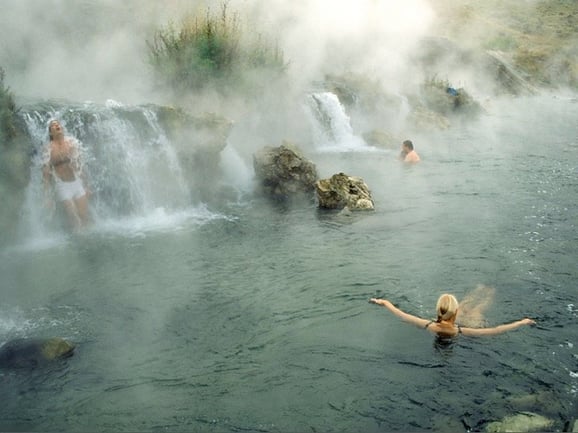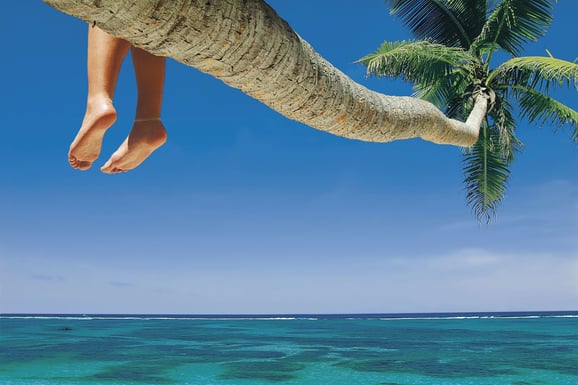
PACKING IS such sweet sorrow. As much as we want to get out of town on the long-awaited vacation, we just can’t leave it all behind. We always bring more than we need—shirts, shoes, and, especially, a stowaway that guarantees we won’t really get away, even if we go someplace else: the performance mindset.
The work mind is essential for getting things done on the job and providing achievement, but a vacation is something you don’t want to get done. The purpose of it is not an outcome or result. It’s an experience to fully immerse in. When we let the performance mindset run things on holiday, we wind up doing the vacation as if it was a job—racking up sites seen and restaurants ticked off, racing through the trip like items on the to-do list.
THE VACATION SABOTEUR
To enjoy and actually participate in the act of your vacation, you need a skill-set apart from your work identity, because the work mind doesn’t know how to play. It only knows outcomes, performance, external metrics. The experience of life and vacations require a different approach, participation for its own sake, which is an intrinsic goal.
Ask for no payoff, and you get a big internal one from your vacation, in the form of gratified core psychological needs such as autonomy and competence. Unlike external goals, which provide a quick bump in happiness and then fade, intrinsic goals—such as fun, enjoyment, learning, challenge, social connection—stick with us by boosting our sense of choice, effectiveness, and our social animal mandate and inform our memories with the positive events that tell us that we like our life.
So before we leave on vacation, we need to focus on unpacking a bunch of stuff first, such as the constellation of behaviors that comes with the work mind. That starts by understanding that there is value in stepping back beyond recharging brains and bodies. It requires a revaluation of time outside the office as something essential to our appointment with life. Time to live is the point of the work and is worthy in and of itself, isn't it?
You need to understand why it’s important for you to disengage from work and engage in activities that bring pleasure and happiness, not for hedonistic or materialistic reasons, but for genuine satisfaction, “I value my time,’ or ‘I’m going to do something I really enjoy,’ or ‘I’m going to be with people.’”
We need to approach the vacation as if it is one of the most important things in our world—because it is. It's your life, calling. It's essential to work-life balance and stress management, something we learn about in my work-life and stress management training programs. And it's the free-est you are going to be all year to discover, relax, and enjoy your world.
So let’s get off to the right start by making sure to check the unpacking list below before you put a single sock in the luggage.
THE UNPACKING LIST - LEAVE THESE STOWAWAYS AT HOME
Results Metric. It’s not about how many sites you tally on your vacation. The key to the internal rewards the science says are there for us on holiday is leaving the productivity drill sergeant at home. The whole point of the trip is the journey, not rushing through attractions to get home as soon as possible.
Stress and the Thinking about Work That Drives It. Vacations cut the risk of heart attack in men by 30% and in women who take more than one vacation a year by 50%. They do this by cutting off the source of stress and allowing our bodies and minds to repair and recuperate. The key to work recovery, as the academics call it, is psychological detachment from thoughts of work. Rumination drives the stress response, spinning a constant replay of false beliefs into what appear to be real ones. Vacations shut off that broken record—if we’re not checking work email and phone calls, that is. If you can’t resist checking in, find a vacation destination without wifi. The other thing about stress is that it suppresses the play equipment in your brain. Not much fun in store when your brain is stuck on fight-or-flight. Leave work at work.
Guilt. You worked hard for this vacation and deserve it. If you can’t enjoy yourself when you are not producing because it makes you feel guilty, you need to ask what’s wrong with this picture. What is the purpose of the work? To work? Or is it to enable what researchers say is the key goal we all have on this planet—to feel like we are writing our own script. The great psychologist Erik Erikson, who studied the life stages, says one of our central questions at the end of our days is going to be, Was it a good time? What will your answer be?
Closedmindedness and Judging. Vacation and travel help us break out of ruts of cynicism, negativity and habitual behavior—if we are open to the change. Be receptive to new experiences and leave the critic, of yourself as well as others, at home. Stop comparing and go with what your brain neurons want more than anything else—novelty and challenge.
The Control Freak. To get the most out of your vacation, you have to give up the wheel and excess steering of events. Figure out what you want to do, but in a way that lets you roll with it and improvise too. Allow yourself the freedom to enjoy whatever happens. The best travel experiences are often the ones we didn’t plan or predict and the people we had no idea we were going to meet in places we didn't know we were going to wind up.
The To-Do List. Leave behind the pressure to accomplish an agenda, or the trip won't be successful. That’s the work mode you are trying to take a respite from. If you don’t want to do anything one morning, stay in bed and enjoy that rare pleasure. It’s your time, and you can do anything you want with it. You want to find a good balance of participant elements and carefree hours that you can use as you like. The goal should be fulfilling time, not filling time.
The Adult Bias Against Play. Play is recognized as a critical component of health and growth in kids, but we have the idea that it’s beneath us solemn grownups because it’s nonproductive, and, therefore, frivolous. Yet play is one of the best stress buffers there is. It increases positive emotions, which crowd out the negative. Play is the ultimate intrinsic goal. It’s 100% about the experience and not the outcome. It roots us in the moment of our experience, and that means we can transcend the anxieties of the other two tenses and enjoy ourselves and the people we’re having fun with. Vacations are great opportunities to try new activities, things we haven’t done before. Play helps us grow. No matter what is happening in other parts of your life, play can help you develop new skills and offer a new form of self-expression that helps us move forward.
After unpacking your bags before you take off, you are going to feel much lighter. And happier. You won’t have a battery of judgments and to-do’s in the way of your enjoyment. You will have a wide open mandate to immerse yourself in the joy of living for its own sake and set yourself up for the right answer to Erikson’s question about whether you had a good time on this planet: OH, YEAH!





